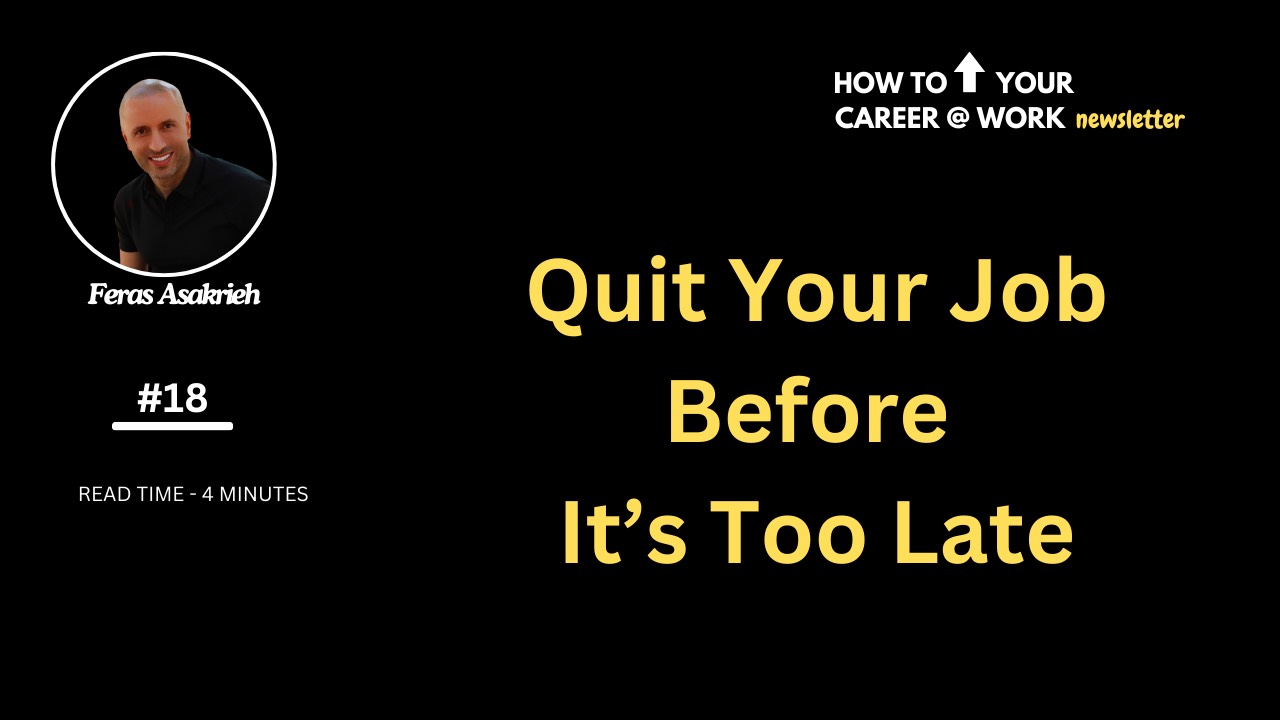
Quit Your Job Before It’s Too Late
READING TIME - 4 MINUTES
One of the hardest questions you will face in your career—or even in life—is whether you should quit or try harder.
I’ve been in that situation many times, deciding whether to stay or leave.
Most people shy away from making a choice because they fear the unknown or the change itself.
Many stay in their current job, feeling miserable, simply because they think it’s safer to stick it out.
What people underestimate is that staying in a job when you know it’s time to leave is often 10 times more harmful than leaving.
Looking back at my own career, every time I thought about leaving, it turned out to be the right choice.
Whether it was because I was no longer interested in what I was doing, surrounded by toxic people, or simply not getting promoted, leaving was the best decision.
Here’s the problem with staying in a job you’re unhappy with: the longer you stay, the harder it becomes to leave.
The more time you invest, the guiltier you feel about walking away.
You become complacent, and your mental and physical health starts to suffer.
Job dissatisfaction is a leading cause of depression, and it’s not worth risking your well-being.
If you’re wrestling with whether to quit or stay, here are four steps to help you make the decision:
Step 1: Define Your "Why”
Most people think they need a big, dramatic reason to leave a job.
But your reason is your reason—what matters to you may not matter to others, and that’s perfectly fine.
For example, I’ve left jobs simply because I didn’t like the management style.
Some people don’t mind that, but for me, it was enough to make me move on.
Your reason doesn’t have to make sense to everyone; it just has to make sense to you.
Step 2: Assess the Fix
Can the issue that’s bothering you be solved by simply waiting it out or transferring to a different team?
Be honest in your assessment.
Sometimes, the problem is temporary or fixable, and leaving might not be necessary.
But if your reason for staying no longer serves you, you’ll know it’s time to move on.
Step 3: Commit to Your Exit Plan
If you’ve answered “no” to Step 2, it’s time to act.
That doesn’t mean you should quit immediately—it means you need to start planning your exit.
One of my biggest mistakes in my career was quitting a job without a plan.
The best time to look for a job is when you already have one.
This is where most people fail.
They keep coming to work every day, hoping things will magically change.
Or they may decide to leave but never follow through.
This step requires you to stop what you’re doing, make a firm decision, set a deadline, and start executing your action plan.
Step 4: Don’t Sabotage Your Career by Staying
Once you’ve decided to leave, commit to it.
Your career will thank you later.
The biggest mistake you can make is staying in a job when you know it’s not right for you.
No one is going to save you—you have to take action to save yourself.
Looking back at my career, some of the most significant turning points happened when I reset and made changes.
At one point, I left my VP role to become a director. It felt like a step-down, but looking back, it was one of the best moves I ever made.
I met new people, learned new skills, opened doors I didn’t even know existed and became more marketable. I’m more valuable now, and people will pay for that experience.
The key takeaway is not whether you should leave or stay—it’s about deciding.
Most people get stuck in the middle, wondering and wishing for something better, without ever making the choice to act.
Make the choice.
Your future depends on it.